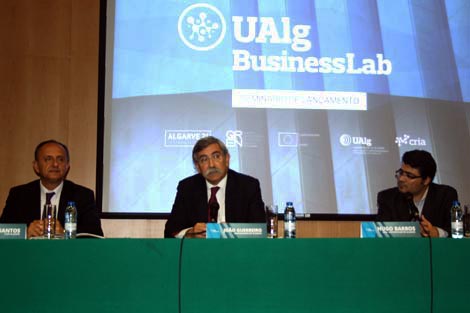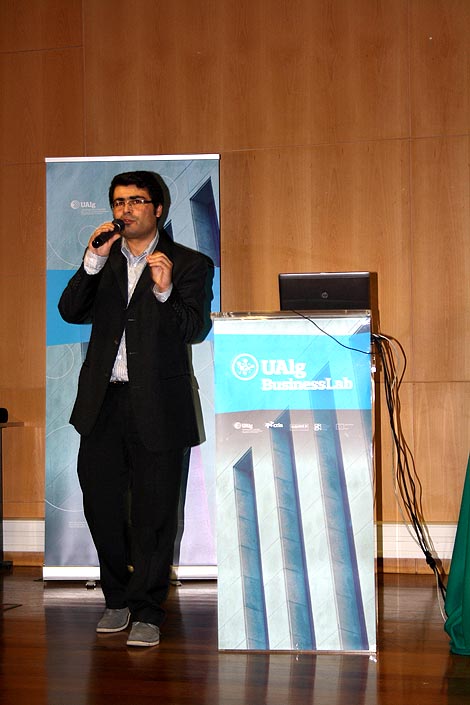 Transferring technology and knowledge from the University of Algarve to companies «has not been easy», but it is a path that has to be done quickly, with greater efficiency and gains for the economy. Taking another step in the relationship between the University of the Algarve and companies in the region and stimulating the transfer of technology and technology-based entrepreneurship, based on knowledge created in the Algarve academy, are the major objectives of the «UAlg Business Lab» project, which was introduced last week.
Transferring technology and knowledge from the University of Algarve to companies «has not been easy», but it is a path that has to be done quickly, with greater efficiency and gains for the economy. Taking another step in the relationship between the University of the Algarve and companies in the region and stimulating the transfer of technology and technology-based entrepreneurship, based on knowledge created in the Algarve academy, are the major objectives of the «UAlg Business Lab» project, which was introduced last week.
Those responsible for the project, which is led by CRIA – Division of Entrepreneurship and Technology Transfer of the University of Algarve and has the support of PO Algarve 21, believe that the trust that already exists between academics and entrepreneurs must be used to generate (good ) business for the region. In addition, there are opportunities for European funding in the coming years that it is essential not to miss, they warn.
“The level of trust between universities and companies has increased. Now, this needs to be taken much further, so that it is reflected in the market. Here in the Algarve, there is already a path open, although the impact on the regional GDP is still small», summarized João Guerreiro.
For the Dean of UAlg, the solution involves both research oriented to the real needs of companies, as well as the creation of consortia to explore knowledge and technology already developed within the academy. Specialized training is another field of action to be explored in years to come.
Project rehabilitates buildings to support research and incubate new companies
 To achieve this end, the «Ualg Business Lab» points in several directions. One of the main aspects of this project has to do with infrastructure to support research and incubation and new technology-based businesses. And it includes three major measures.
To achieve this end, the «Ualg Business Lab» points in several directions. One of the main aspects of this project has to do with infrastructure to support research and incubation and new technology-based businesses. And it includes three major measures.
From the outset, the creation of the new building for the Medicine Course, which will consist of completing an existing building of the Faculty of Science and Technology, adding the fourth and final wing. In addition to providing other conditions for the Integrated Masters in Medicine, spaces will be created for research in the health sciences and for incubation for new businesses that arise in this area.
Another strong bet will be on improving conditions for research in the area of the sea. In this field, there will be investment in the requalification of the Ramalhete Station, located next to the Ria Formosa and where many projects are being developed.
Finally, the existing masonry pavilions on the Campus de Gambelas will be restored to create more incubation spaces next to the CRIA, which is based there. All this will motivate an investment of 3,5 million euros, shared by the Euroapian Union.
These physical conditions will be joined by initiatives aimed at getting companies and researchers to talk and encourage entrepreneurship. For this, the so-called technological “matching” will be promoted, through a thorough intersection between the real and current needs of companies and what has already been done by UAlg researchers.
Another major objective is the "strengthening of human potential and its empowerment", as well as "giving substance to projects with economic potential", as illustrated by the director of CRIA Hugo Barros. "We will continue to promote Business Ideas Contests and incubate new businesses, as well as provide post-incubation support," he added.
The «Ualg Businnes Lab» will last until June 2015, when the CRIA wants «to have practical results to show». Something that will be especially important, considering that the strategy adopted by the Algarve Regional Coordination and Development Commission for the 2014/2020 funding period is based on a logic of making the most of knowledge and financing projects that go in this direction.
“This objective of stimulating technology transfer is already behind and was already identified in the strategy for 2007/13 [the current Community Support Framework]. So that we are not talking about it seven years from now, the success of this candidacy is fundamental», illustrated the president of CCDRA David Santos.
From the entity that manages the European funds specifically destined for the Algarve region, there is a guarantee that there will be money in the next seven years to stimulate the transfer of knowledge from the university to the companies. In particular, to “support human capital”.
Thus, European monies can support "post-Doc research, provided they have a clear objective of benefiting a company's business". In other words, companies will have an extra incentive to invest in cutting-edge research, dedicated to improving their performance.


















Comments